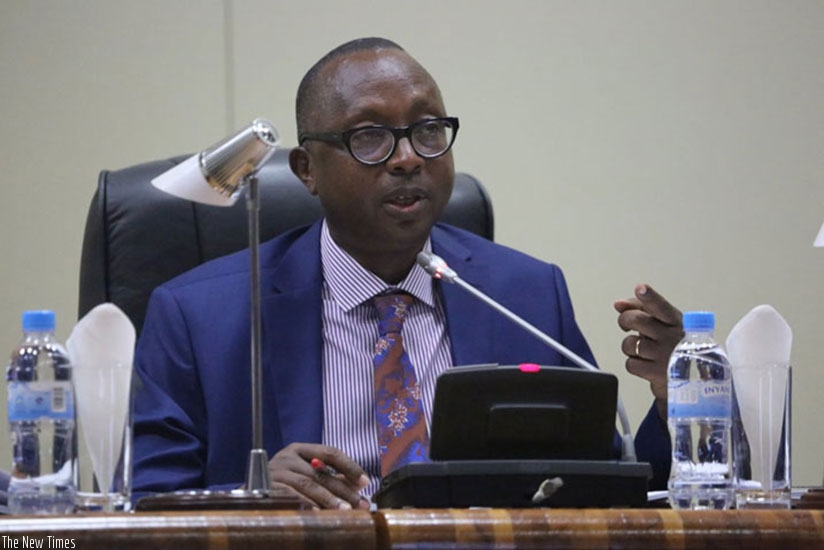Last week, the Auditor-General presented the 2015/16 annual report to a joint session of senators and deputies. Among issues highlighted in the report include public entities ignoring previous recommendations by the Auditor General which has led to loss of billions of tax payers'money.


Last week, the Auditor-General presented the 2015/16 annual report to a joint session of senators and deputies. Among issues highlighted in the report include public entities ignoring previous recommendations by the Auditor General which has led to loss of billions of tax payers'money.
Harsh punishment delivered with requisite swiftness, it is believed, would serve as a vital deterrent to officials who not only mismanage, or steal tax payers’ money, but fail to heed the AG's recommendations, according to the civil society.
"Entities not implementing recommendations should be held accountable and harshly punished to prevent future occurrence. Silence or insufficient follow up can lead to impunity and to further occurrence of similar practices,” Edward Munyamaliza, the president of the Civil Society Platform, told The Sunday Times.
"Then, we would be heading nowhere. Civil society and Parliament have to work together on follow ups and accountability.”
Key issues from the audits include what is noted as a declining trend in implementation of Auditor General’s recommendations as required by Article 69 of the 2013 Organic Law on State Finances and property, from 60 percent in 2013, to 58 percent in 2014, 50 percent in 2015 and remained at 50 percent this year.
This declining trend in implementation of recommendations, Biraro told Parliament, "is eroding gains so far made in public financial management.”
Prosecutor-General Jean Bosco Mutangana said he could not ably comment on the new AG report before he receives and peruses it but he maintained that whenever his office received the AG’s reports, as in the past, "we acted swiftly” and did what is necessary.
Mutangana said: "I would not like to comment on the latest report before I read it but, remember that what we do is based on evidence. A number of cases were taken to court and people were prosecuted. And, most importantly, we are still very committed such that whenever there is evidence we ensure that justice will be done. Nobody is above the law.”
"After the AG report is published, we gather facts; check for corruption or embezzlement and other criminal acts and act accordingly. We take the Auditor General’s reports seriously. And we shall do the same with respect to the new report.”Case of impunity
Marie Immaculée Ingabire, Chairperson of Transparency International Rwanda, said that sadly, it appears as if the AG’s recommendations will never be properly implemented.
Ingabire said: "It appears that these recommendations will never be properly implemented, simply because the people supposed to do that never face any repercussions for failing to act. Nobody really cares and this is a case of impunity.
The only authority that can help sort this out is the prosecution. But again, even the law has to be changed and issues within public finance management be given more fitting names.
"For example, if one pays money to a contractor before work is finished or before checking for proper standards then this person should be held accountable. I am frustrated. We are an undeveloped country but we are slow when it comes to acting on crucial things. We are not acknowledging the fact that public resources are actually our own and should be managed as such.”
If only public servants managed state assets as if they were their own, she said, nothing would be put to waste.
Other key issues, the Auditor General reported, are: delayed and abandoned contracts leading to loss of value for money. Between the 2013/2014 and 2015/2016 financial years, it is reported that 98 contracts worth Rwf 95.67 billion were either been abandoned or significantly delayed.
Ingabire posed: "Nearly all of those individuals mentioned in the Auditor General’s report have at one time built their own houses. Is there any one of them who act tough when a bag of cement went missing? Why can’t they do the same when it comes to public assets? There is need for real action. The courts too should not pronounce lenient sentences to those who are found guilty. Why would someone who embezzles billions be given a three year sentence?”
The AG’s report also points out the concern of 24 of the contracts worth Rwf 13.39 billion abandoned in addition to contractors disappearing after receiving payments worth Rwf 5.62 billion.
In spite of its continued and seemingly difficult struggle against corruption, the Corruption Perception Index, released early this by Transparency International placed Rwanda alongside Mauritius as third least corrupt country in sub-Saharan Africa. The annual report ranked Rwanda 50th least corrupt country globally, retaining the same 54 per cent score as last year.
editorial@newtimes.co.rw


